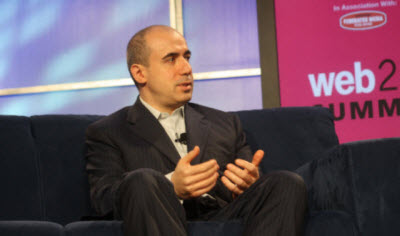May 7, 2010 — Zynga threatens to leave Facebook after the social network requires exclusive use of Facebook Credits for monetizing apps. Zynga plans to distance itself from Facebook with Zynga Live network.
March 18, 2010 — Zynga announces it will open second overseas office in Ireland.
March 16, 2010 — Steven Chiang, former EA Sports chief at Electronic Arts, joins Zynga as president of game studios.
Feb. 17, 2010 — Opens Zynga India office in Bangalore, first office outside the U.S.
AI Weekly
The must-read newsletter for AI and Big Data industry written by Khari Johnson, Kyle Wiggers, and Seth Colaner.
Included with VentureBeat Insider and VentureBeat VIP memberships.
Jan. 12, 2010 — Zynga relaunches Offers with eight well-known brands.
Dec. 31, 2009 — Revenues hit $121.5 million and net loss is $52.8 million. About 83 percent of Zynga’s revenue came from its top three games. Zynga closes the year with 576 employees.
 Dec. 15, 2009 — DST, led by Russian investor Yuri Milner (pictured) invests $180 million in Zynga.
Dec. 15, 2009 — DST, led by Russian investor Yuri Milner (pictured) invests $180 million in Zynga.
Dec. 10, 2009 — Zynga sued over deceptive offers.
Nov. 17, 2009 — With more than 196 million monthly active users, Zynga raises another $15.18 million from Kleiner Perkins in an extension to its second funding round.
Nov. 16, 2009 — Zynga named one of the hottest new brands by Advertising Age.
Nov. 14, 2009 — Zynga’s FishVille allowed on Facebook again.
Nov. 9, 2009 — Electronic Arts says it will lay off 1,500 people and buy Zynga rival Playfish for as much as $400 million.
Nov. 8, 2009 — Facebook puts Zynga FishVille on hold for ad violations. Pincus announces that Zynga will remove all of its CPA offers. The move means that Zynga’s ad revenues will take a big hit.
 Nov. 6, 2009 — Techcrunch runs video of Zynga CEO Mark Pincus saying, “I did every horrible thing in the book just to get revenues.”
Nov. 6, 2009 — Techcrunch runs video of Zynga CEO Mark Pincus saying, “I did every horrible thing in the book just to get revenues.”
Nov. 2, 2009 — In “Scamville” article, Techcrunch says a third of Zynga’s revenue comes from lead generation and other offers. Zynga takes steps to remove deceptive offers. But Pincus defends the practice of offering CPA offers.
Oct. 31, 2009 — Techcrunch runs story on “Scamville,” or how social games are supported by shady offers that deceive consumers.
Oct. 20, 2009 — Zynga donates $487,500 to support Haitian children. At the Web 2.0 Summit, Pincus predicts an “app economy” in the future. Zynga has more than 50 million users.
Sept. 13, 2009 — Zynga settles Mob Wars litigation.
Sept. 10, 2009 — Zynga sues Playdom for stealing trade secrets.
July 31, 2009 — Surpassing Yahoo Games, Zynga becomes biggest online game operator in the U.S. with 44 million monthly unique users. Pincus says that Zynga will generate more than $100 million in revenues in 2009. Zynga has 330 employees and 110 open jobs.
June 30, 2009 — Zynga hires Brian Reynolds as chief game designer. He sets up Zynga East as a new game studio in Baltimore, Md.
June 22, 2009 — FarmVille launches. It will grow to become the biggest social game of its time.
June 13, 2009 — The company bans a number of players for hacking the system to get more poker chips.
June 12, 2009 — Mark Pincus says Zynga is not planning an IPO. The company has more than 250 employees. Top rivals include Playfish, Playdom and SGN.
June 5, 2009 — Zynga acquires social network and game maker MyMiniLife. The company’s game engine becomes the infrastructure for FarmVille.
March 24, 2009 — At the first annual GamesBeat conference, Mark Pincus declares that social gaming isn’t a fad.
 Feb. 14, 2009 — Mob Wars creator David Maestri and his company, Psycho Monkey, sue Zynga for its copycat game Mafia Wars.
Feb. 14, 2009 — Mob Wars creator David Maestri and his company, Psycho Monkey, sue Zynga for its copycat game Mafia Wars.
Dec. 31, 2008 — Zynga’s revenues hit $19.4 million, with a loss of $22.1 million. Zynga has 157 employees.
July 23, 2008 — Kleiner Perkins Caufield & Byers invests $29 million in Zynga. Bing Gordon joins Zynga’s board.
June 2008 — Zynga acquires YoVille and launches Mafia Wars.
Mid-2008 — Zynga has 50 employees and it focuses on “organic development” where the company builds it all itself, quickly. Slide and RockYou emerge as the top app makers on Facebook.
April 28, 2008 — Bing Gordon resigns from Electronic Arts to become a partner at Kleiner Perkins Caufield & Byers.
March 2008 — Zynga adds virtual goods transactions to the poker game.
Jan. 15, 2008 — Union Square Ventures, Foundry Group, Avalon Ventures, Reid Hoffman, Peter Thiel and other angels invest $5 million in Zynga. Additional funding is added a month later.
Dec. 31, 2007 — Zynga’s revenues for the year hit $693,000 with a net loss of $846,000.
July 2007 — Mark Pincus renames the new company Zynga. Early team includes Eric Schiermeyer, Michael Luxton, Justin Waldron, Kyle Stewart, Scott Dale, John Doerr, Steve Schoettler, Kevin Hagan and Andrew Trader. Its first game is Texas Hold ‘Em Poker, later called Zynga Poker.
April 19, 2007 — Mark Pincus starts a company called Presidio Media. It will later morph into Zynga.
VentureBeat's mission is to be a digital town square for technical decision-makers to gain knowledge about transformative enterprise technology and transact. Learn More
